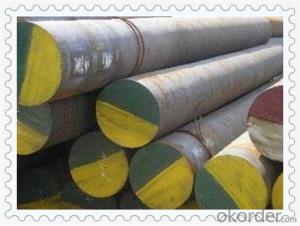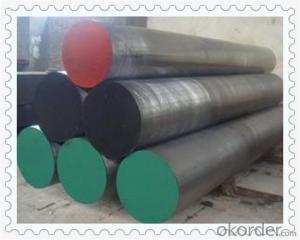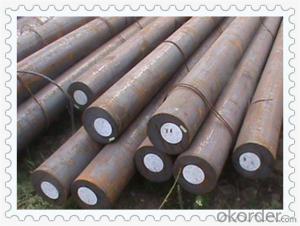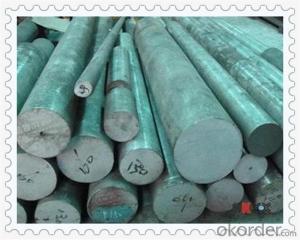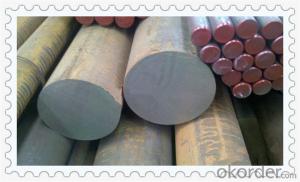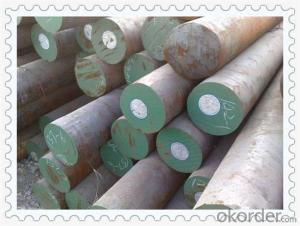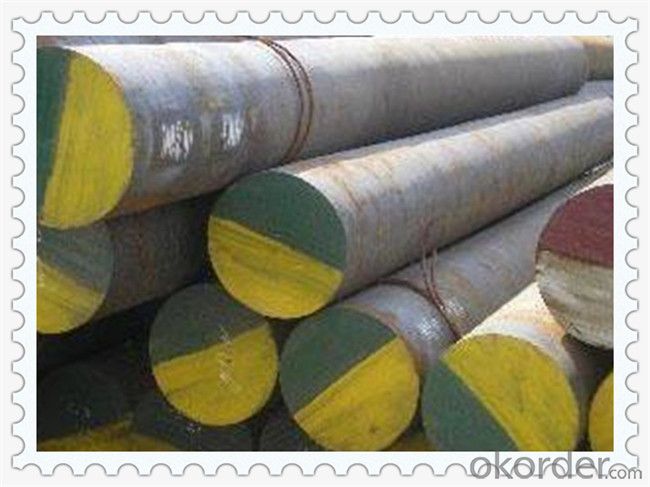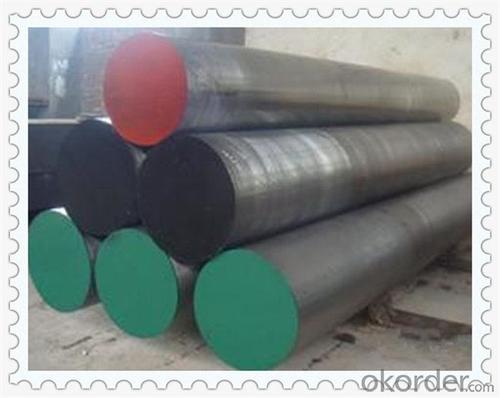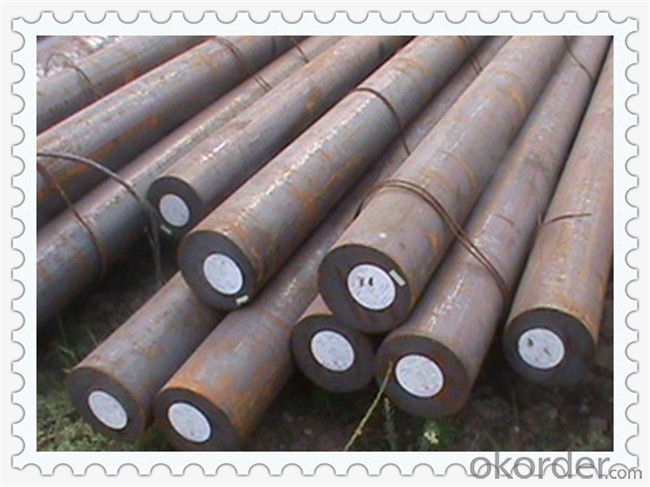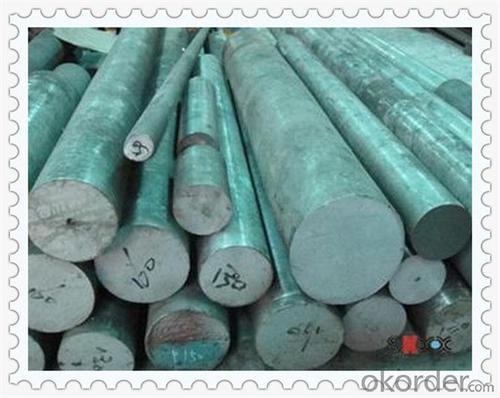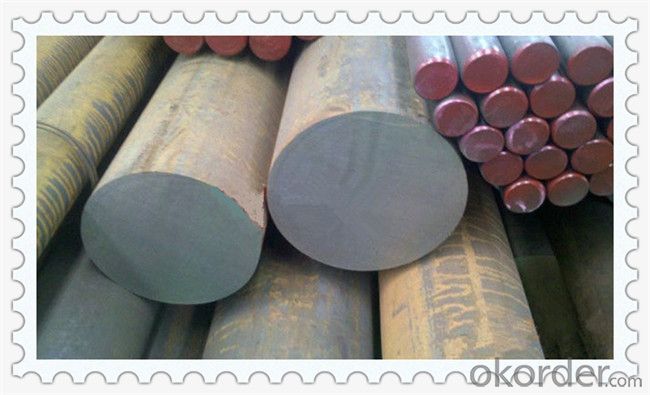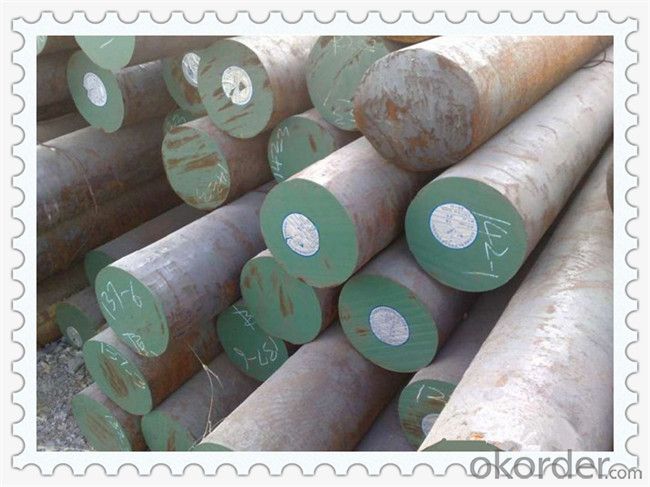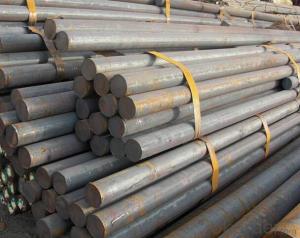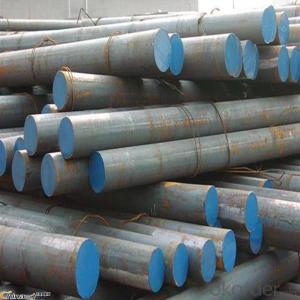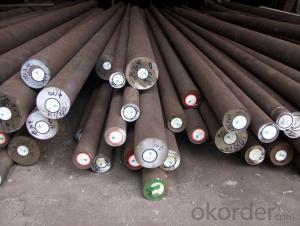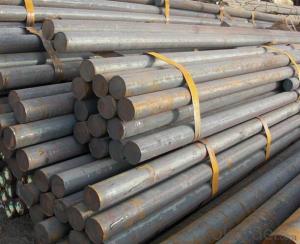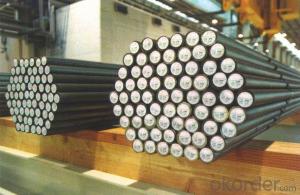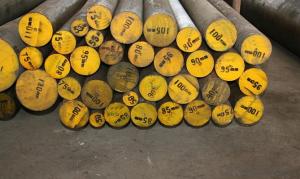High Strength Steel Round Bar 4140 Round Bar Steel
- Loading Port:
- China main port
- Payment Terms:
- TT OR LC
- Min Order Qty:
- 30 m.t.
- Supply Capability:
- 10000 m.t./month
OKorder Service Pledge
OKorder Financial Service
You Might Also Like
High Strength Steel Round Bar 4140 Round Bar Steel
Products Details
Steel, High Strength Steel Round Bar, 4140 Round Bar Steel
1. Annealed/Q+T
2. Sample free
3. Black
4. Quality assurance
1,Size of 4140 Carbon Alloy Steel | ||||||||
Round bar | Diameter(mm) | Length (mm) | ||||||
20~800 | 3000~9000 | |||||||
Plate | Thickness(mm) | Width (mm) | Length (mm) | |||||
Max:800 | Max:2200 | Max:9000 | ||||||
The specification can be customized. | ||||||||
2,Chemical Compositons | ||||||||
Grade | C | Si | Mn | P | S | Cr | Mo | Ni |
42CrMo | 0.38~0.45 | 0.17~0.37 | 0.50~0.8 | ≤0.035 | ≤0.035 | 0.9~1.2 | 0.15-0.25 | ≤0.3 |
4140 | 0.40~0.45 | 0.15~0.35 | 0.75~1.0 | ≤0.035 | ≤0.040 | 0.8~1.1 | 0.15-0.25 | - |
SCM44 | 0.38~0.43 | 0.15~0.35 | 0.60~0.9 | ≤0.030 | ≤0.030 | 0.9~1.2 | 0.15-0.30 | ≤0.25 |
| 1.7225 | 0.38~0.45 | ≤0.40 | 0.60~0.9 | ≤0.025 | ≤0.035 | 0.9~1.2 | 0.15-0.30 | |
3,Features of 4140 alloy steel | ||||||||
1, Chromium molybdenum alloy steel | ||||||||
2, Slightly higher carbon content then 4130 | ||||||||
3, Greater strength and heat treatment | ||||||||
4,Typical Applications | ||||||||
1, Applications in the oil and gas sector | ||||||||
2, Connection rods, collets, conveyor pins, | ||||||||
3, Gears, stem assemblies, | ||||||||
4, Pump shafts and tool holders | ||||||||
Main Products
Alloy Steel | 5140,5115,5120,5130,5145,4118,4130,4135,6150,5115,4142,4130,4118,6150,4140,4720,4320 ,E9310,8620,4340 |
Tool Steel | H13,1.2344,SKD61,D2,SKD11,1.2379,1.2510,01,SKS3,95MnWCr5,D3,SKD1,1.2419, SKS31,H21,SKD5,1.2581,P20,35CrMo7,1.2738,1.2316,M2 |
Bearing Steel | GCr15,52100,SUJ1,SUJ2,100Cr6,1.2067,55C,8620,4320,9310,440C,M50 |
Spring Steel | 9260,SUP6,SUP7,1.7108,54SiCr6,1.7102,5155,SUP9,1.7176,5160,1.7177,6150, SUP10,51CrV4,1.8159 |
Stainless Steel | 321,sus321,1.4541,304,SUS304,1.4301,410,SUS410,1.4006,420,1.4021,1.4028, 434,1.4113,316L,SUS316L,1.4435,630,1.4542,431,1.4057,201,202,301 |
Products Show
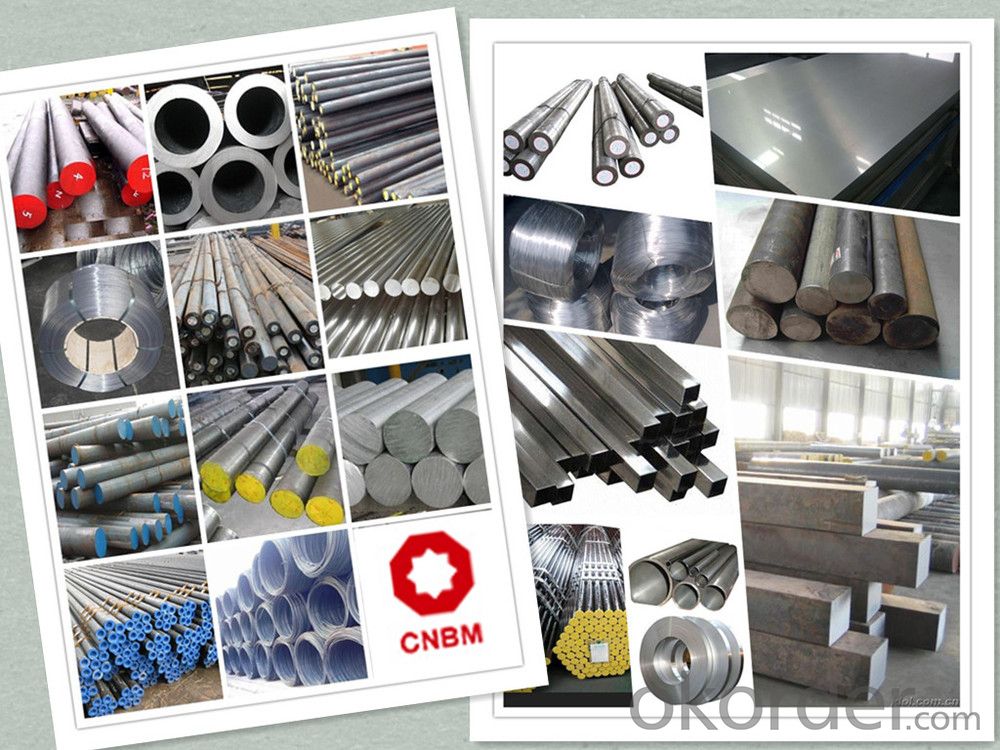
Application
| Carbon Steel | Mold bottom, Plastic mold, Construction machinery parts Automobile parts, Security grills, Screens, Construction |
| Bearing Steel | Aerospace, Navigation, Nuclear energy, Chemical industry Electronic information, Petrochemical, Instrument and meter Transportation |
| Cr-Mo Steel | Mechanism & Fasteners gear, Stressed components for vehicles Engines and machines, Parts of larger cross-section |
| Gear Steel | All kinds of gears, Statically and dynamically stressed component for vehicles Engines and machine, Larger cross-section parts, Crankshafts |
Work Shop
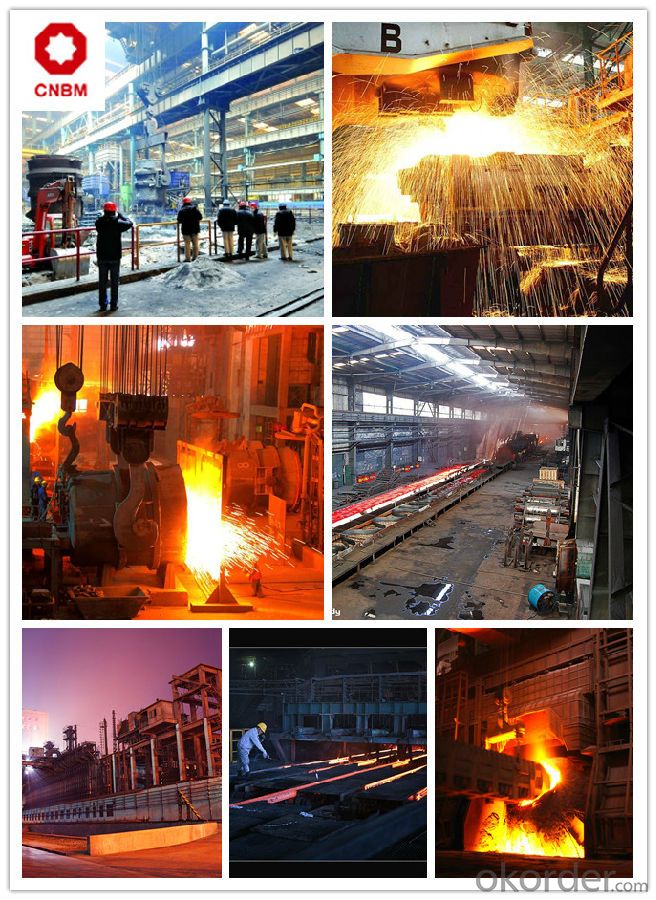
Company Information
CNBM International Corporation is the most important trading platform of CNBM group.
Whith its advantages, CNBM International are mainly concentrate on Cement, Glass, Iron and Steel, Ceramics industries and devotes herself for supplying high qulity series of refractories as well as technical consultancies and logistics solutions.

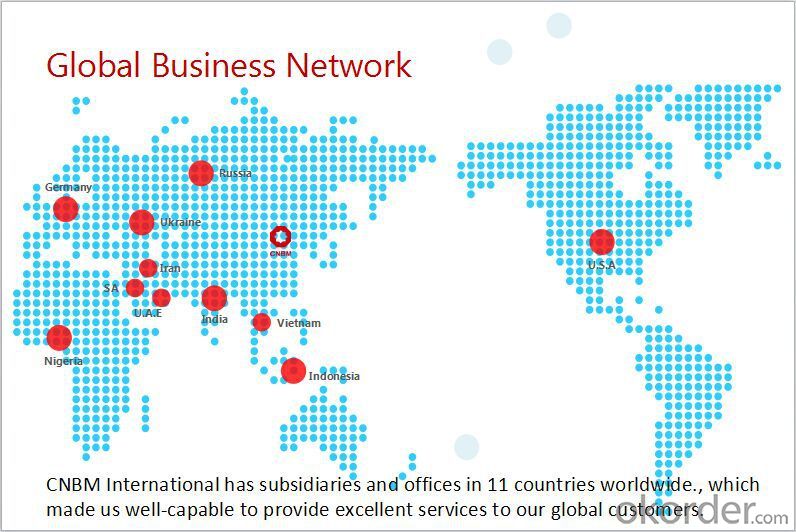
FAQ
1, Your advantages?
professional products inquiry, products knowledge train (for agents), smooth goods delivery, excellent customer solution proposale
2, Test & Certificate?
SGS test is available, customer inspection before shipping is welcome, third party inspection is no problem
3, Factory or Trading Company?
CNBM is a trading company but we have so many protocol factories and CNBM works as a trading department of these factories. Also CNBM is the holding company of many factories.
4, Payment Terms?
30% TT as deposit and 70% before delivery.
Irrevocable L/C at sight.
5, Trading Terms?
EXW, FOB, CIF, FFR, CNF
6, After-sale Service?
CNBM provides the services and support you need for every step of our cooperation. We're the business partner you can trust.
For any problem, please kindly contact us at any your convenient time.
We'll reply you in our first priority within 24 hours.
Packaging & Delivery
1, Packaging: seaworthy package or as required
2, Delivery: 35-45 days or based on quantity
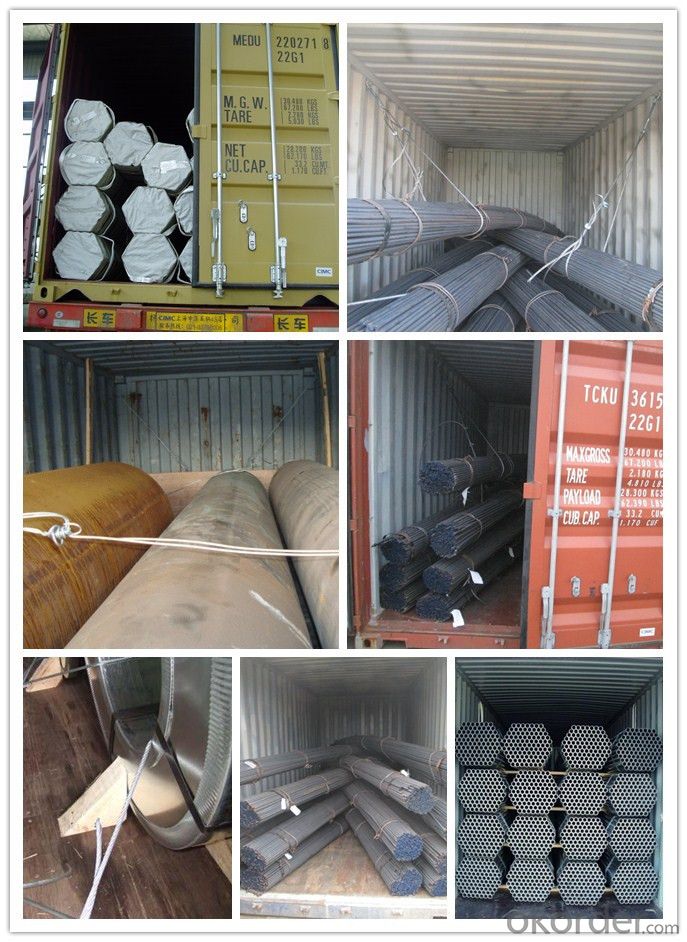
- Q: How do you calculate the weight of a steel round bar based on its length and volume?
- In order to determine the weight of a steel round bar based on its length and volume, it is necessary to have knowledge of the steel's density. The density denotes the mass per unit volume of the material. The weight can be calculated using the following formula: Weight = Volume × Density To begin, one must calculate the volume of the steel round bar. The volume of a cylinder, which is the shape of a round bar, can be determined using the following formula: Volume = π × (Radius)^2 × Length The value of π is a mathematical constant approximately equal to 3.14, and Radius represents the radius of the round bar. Once the volume is obtained, it can be multiplied by the density of the steel to find the weight. It is important to note that the density of steel may vary depending on the specific type being used. For instance, mild steel has a density of approximately 7850 kg/m³. Therefore, the weight of the steel round bar can be calculated as: Weight = Volume × Density For example, let us consider a steel round bar with a length of 1 meter and a radius of 0.5 meters. To calculate the weight, we first need to determine the volume: Volume = π × (0.5)^2 × 1 Volume = 0.7854 m³ Next, we multiply the volume by the density of steel: Weight = 0.7854 m³ × 7850 kg/m³ Weight = 6171.79 kg Hence, the weight of the steel round bar would be approximately 6171.79 kg.
- Q: How do you store and handle steel round bars?
- When it comes to storing and handling steel round bars, there are several important factors to consider. Firstly, it is crucial to ensure that the storage area is clean, dry, and free from any moisture or corrosive materials. This will help prevent rust and other forms of damage to the steel bars. The steel round bars should be stored horizontally, either on racks or on a flat surface, to prevent deformation or sagging. It is recommended to stack them in a way that avoids excessive pressure on any individual bar, as this could lead to bending or warping. To handle steel round bars safely, it is best to use appropriate lifting equipment such as cranes, forklifts, or hoists. Manual handling should be avoided whenever possible, as steel bars can be heavy and cumbersome. When using lifting equipment, it is important to ensure that the bars are properly secured and balanced to prevent accidents or injuries. In addition, it is essential to use protective measures such as gloves and safety shoes when handling steel round bars, as they may have sharp edges or rough surfaces. Proper personal protective equipment (PPE) should be worn to minimize the risk of cuts, abrasions, or other injuries. Regular inspections should be conducted to check for any signs of damage, such as dents, cracks, or corrosion. Any damaged bars should be separated from the rest and either repaired or discarded, depending on the severity of the damage. By following these guidelines for storage and handling, you can ensure the longevity and quality of steel round bars, while also maintaining a safe working environment for yourself and others.
- Q: How do you calculate the fatigue strength of a steel round bar?
- The fatigue strength of a steel round bar can be calculated using various methods, such as the stress-life (S-N) curve approach or the strain-life (ε-N) curve approach. 1. Stress-Life (S-N) Curve Approach: This method involves plotting the stress amplitude (S) against the number of cycles to failure (N) on a log-log scale. The S-N curve is obtained by subjecting multiple specimens of the steel round bar to different stress levels and measuring the number of cycles to failure for each stress level. The fatigue strength of the steel round bar can be determined by identifying the stress level at which the desired number of cycles to failure is achieved, typically referred to as the endurance limit. 2. Strain-Life (ε-N) Curve Approach: This method involves plotting the strain amplitude (ε) against the number of cycles to failure (N) on a log-log scale. Similar to the S-N curve approach, multiple specimens of the steel round bar are subjected to different strain levels, and the number of cycles to failure is measured. The strain-life curve can then be used to determine the fatigue strength by identifying the strain level corresponding to the desired number of cycles to failure. It is important to note that calculating the fatigue strength of a steel round bar requires conducting fatigue tests on representative specimens under controlled conditions. These tests involve subjecting the specimens to cyclic loading, typically in the form of tension-compression cycles, and recording the number of cycles to failure. The obtained data is then used to construct the S-N curve or the ε-N curve, which provides valuable information about the fatigue behavior and strength of the steel round bar.
- Q: What is the difference between a bright and a black steel round bar?
- The appearance and surface finish are the main factors that differentiate a bright steel round bar from a black steel round bar. A bright steel round bar, also referred to as a bright drawn or turned bar, possesses a sleek and glossy surface. This is accomplished through a process known as cold drawing, wherein the steel bar is pulled through a die to eliminate any flaws and create a consistent shape. The outcome is a highly polished and reflective surface that is aesthetically pleasing. Conversely, a black steel round bar features a dark, rough, and non-reflective surface. This is due to the fact that it does not undergo the same cold drawing process as a bright steel bar. The black surface is typically a result of the scale that forms on the steel during the manufacturing process, which remains intact. In terms of properties, both bright and black steel round bars are composed of the same material, typically carbon steel. Thus, their mechanical properties such as strength, hardness, and toughness are generally similar. However, the manufacturing process of the bright steel bar aids in enhancing its surface quality and dimensional accuracy in comparison to the black steel bar. Ultimately, the choice between a bright and a black steel round bar depends on the desired aesthetic appearance and the specific requirements of the application. Bright steel bars are commonly used in decorative applications where a polished and visually appealing finish is desired. On the other hand, black steel bars are often utilized in structural applications where surface appearance is less important but strength and durability are crucial.
- Q: Are steel round bars suitable for use in the oil and gas industry?
- Steel round bars are well-suited for the oil and gas industry due to their strength, durability, and high resistance to corrosion. They can withstand the challenging and harsh environments encountered in this industry, making them reliable for critical components such as drilling tools, valves, pipelines, and offshore structures. In the oil and gas industry, extreme temperatures, pressures, and corrosive substances are present in offshore rigs, refining facilities, and pipelines. Steel round bars can withstand these conditions and maintain their structural integrity, making them a reliable choice for critical components. Steel round bars also offer versatility as they can be easily machined, welded, and fabricated into different shapes and sizes. This flexibility is crucial in the oil and gas industry, which often requires unique and complex equipment. Moreover, steel round bars possess excellent mechanical properties such as high tensile strength and impact resistance. These properties are essential for withstanding heavy loads and dynamic forces associated with oil and gas operations, ensuring the safety and reliability of equipment and structures. Additionally, steel round bars have a high resistance to corrosion, which is vital in the oil and gas industry due to the presence of corrosive substances like hydrogen sulfide and saltwater. This corrosion resistance ensures the longevity and reliability of equipment, reducing maintenance costs and downtime. In conclusion, steel round bars are a suitable choice for the oil and gas industry due to their strength, durability, corrosion resistance, and versatility. They are ideal for various applications, ensuring the safe and efficient operation of equipment and structures in this demanding industry.
- Q: What are the different safety considerations when working with steel round bars?
- When working with steel round bars, there are several safety considerations that need to be taken into account. First and foremost, it is important to wear appropriate personal protective equipment (PPE) such as safety glasses, gloves, and steel-toed boots to protect against potential hazards. One of the main safety concerns when handling steel round bars is the risk of injury from sharp edges or burrs. These can cause cuts or puncture wounds if not handled with care. It is crucial to inspect the round bars for any sharp edges or burrs and file them down or use protective coverings if necessary. Another important consideration is the weight of the steel round bars. Depending on their size and length, they can be quite heavy and may require the use of lifting equipment or assistance from another person to prevent strain or back injuries. It is essential to use proper lifting techniques and avoid overexertion when moving or transporting the bars. Fire safety is also a concern when working with steel round bars. Steel can conduct heat and electricity, so it is important to take precautions to prevent sparks or heat sources from igniting flammable materials in the vicinity. Fire extinguishers should be readily available, and the work area should be well-ventilated to minimize the risk of fire or smoke inhalation. Additionally, when cutting or manipulating steel round bars, there is a potential for flying debris or metal chips. Safety goggles or a face shield should be worn to protect the eyes from these hazards. It is also important to use appropriate cutting tools and techniques to prevent accidents or injuries. Finally, it is crucial to have proper training and knowledge of the equipment and machinery used when working with steel round bars. This includes understanding the correct procedures for cutting, bending, or welding the bars, as well as being aware of any specific safety precautions related to the machinery being used. Overall, safety should always be a top priority when working with steel round bars. By following these considerations and taking the necessary precautions, the risk of accidents or injuries can be minimized, ensuring a safe working environment.
- Q: What are the different shapes available for steel round bars?
- The different shapes available for steel round bars include round, square, hexagonal, and flat.
- Q: What are the different types of steel round bars used in the manufacturing of bearings?
- There are several different types of steel round bars used in the manufacturing of bearings. The specific type of steel used will depend on various factors, such as the application, load capacity, and desired performance characteristics of the bearing. One commonly used type of steel for manufacturing bearings is through-hardened steel. This type of steel is heat-treated to achieve a uniform hardness throughout the entire bar. Through-hardened steel round bars provide excellent strength and wear resistance, making them suitable for high-load bearing applications. Another type of steel that is frequently used in bearing manufacturing is case-hardened steel. This steel is hardened only on the surface, while the core remains relatively soft. Case-hardened steel round bars offer a combination of high surface hardness for wear resistance and a softer core for improved toughness and impact resistance. Stainless steel is also utilized in the production of bearings, particularly in applications that require corrosion resistance or operate in harsh environments. Stainless steel round bars have excellent resistance to rust and corrosion, making them ideal for use in marine or chemical industries. Furthermore, alloy steel round bars are commonly employed in bearing manufacturing. These steels are made by adding various alloying elements, such as chromium, molybdenum, or nickel, to enhance specific properties like hardness, toughness, or heat resistance. Alloy steel round bars are often used in specialized bearing applications that require exceptional performance under high temperatures or extreme conditions. In summary, the different types of steel round bars used in bearing manufacturing include through-hardened steel, case-hardened steel, stainless steel, and alloy steel. Each type offers unique properties and characteristics that make them suitable for specific bearing applications.
- Q: Can steel round bars be hardened through heat treatment?
- Steel round bars can indeed be hardened by undergoing heat treatment. This process entails heating the steel to a specific temperature and then swiftly cooling it to achieve the desired level of hardness and strength. Various heat treatment techniques, such as quenching and tempering, can be employed to harden steel round bars. In quenching, the steel is heated to a critical temperature and then rapidly cooled in a liquid medium, such as oil or water, to attain maximum hardness. On the other hand, tempering involves reheating the quenched steel to a lower temperature in order to reduce brittleness and enhance toughness, while still maintaining the desired hardness level. By subjecting steel round bars to heat treatment, their mechanical properties can be significantly improved, making them suitable for a wide range of applications that demand high levels of strength and hardness.
- Q: Can steel round bars be used in the construction of bridges?
- Yes, steel round bars can be used in the construction of bridges. They provide structural strength, durability, and flexibility, making them suitable for various components such as piers, beams, and reinforcements. The high tensile strength of steel round bars allows for the construction of longer and larger bridges, ensuring stability and safety. Additionally, steel is resistant to corrosion, which is crucial in bridge construction due to exposure to environmental elements.
Send your message to us
High Strength Steel Round Bar 4140 Round Bar Steel
- Loading Port:
- China main port
- Payment Terms:
- TT OR LC
- Min Order Qty:
- 30 m.t.
- Supply Capability:
- 10000 m.t./month
OKorder Service Pledge
OKorder Financial Service
Similar products
Hot products
Hot Searches
Related keywords
